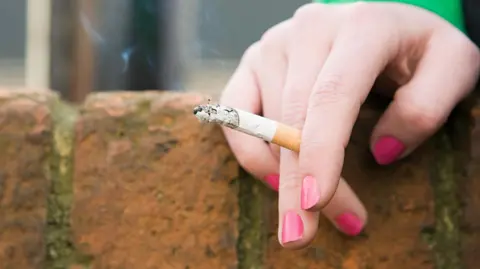 Getty Images
Getty ImagesMinisters are considering tighter restrictions on smoking outdoors as part of a drive to phase out tobacco.
As first reported by the Sun, smoking could be banned in pub gardens, outdoor restaurants and outside hospitals and sports grounds.
The measures – the details of which are still unknown – are being proposed as part of a tougher version of the last government’s Tobacco and Vapes Bill, which was dropped before the last election.
Health experts have welcomed the plans, but hospitality figures and Conservative politicians have warned of potental economic harm.
The King’s Speech at the state opening of Parliament last month promised to reintroduce the last government’s legislation, which would have outlawed the sale of tobacco to anyone born on or after January 2009.
The Sun said secret Whitehall papers confirmed the plan to extend the indoor smoking ban despite some opposition within government.
The outdoor smoking ban would apply to England and Wales only, though devolved governments in Scotland and Northern Ireland could choose to adopt similar proposals.
The BBC has sought further comment from the government.
The Department of Health and Social Care said it did not comment on leaks but was considering a range of measures to “finally make Britain smoke-free”.
A spokesperson added: “Smoking claims 80,000 lives a year, puts huge pressure on our NHS, and costs taxpayers billions.
“We are determined to protect children and non-smokers from the harms of second-hand smoking.”
Hospitality bosses have said that any plans to ban smoking would not be “without economic harm”.
Kate Nicholls, chief executive of trade group UK Hospitality told BBC Radio 4’s Today programme: “This needs to be thought through very carefully before we damage businesses and economic growth and jobs.”
But health professionals have welcomed the proposals, which they described as overdue.
Dr Layla McCay of the NHS Confederation told the Today programme she was “heartened” that progress was being made to abolish smoking.
She said hard decisions needed to be made but: “Ultimately, all of these steps are steps in the same journey, which is towards a smoke-free future for Britain, reducing those health inequalities, reducing the huge problems that are caused to the individual and to society from smoking.”
Deborah Arnott, chief executive of the charity Action on Smoking and Health (ASH) said the government was “catching up with what the public expects, and that’s not to have to breathe in tobacco smoke in places like children’s play areas and seating areas outside pubs, restaurants and cafes”.
However, she added it was important to ensure that there were still outdoor areas for people to “smoke in the open air, rather than inside their homes”.
Meanwhile th Conservative opposition, including leadership contenders, have criticised the proposals as over-regulation.
Priti Patel, the former home secretary, said the plans amounted to “nanny state regulation” that would be “economically damaging”.
Former home office minister Robert Jenrick posted on social media saying: “The last thing this country needs is thousands more pubs closing.”
Former Conservative special adviser Anita Boateng told the BBC: “It feels a very draconian step for people who are adults who can make decisions and who can legally smoke.
“The point is you are in an outside area of a pub garden in a walled off area. You don’t have to stand there if you don’t want to experience second-hand smoking.”
About 12.9% of people aged 18 and over in the UK – or about 6.4 million people – smoked cigarettes in 2022 according to the most recently available data from the Office of National Statistics.
That is the lowest proportion of current smokers since records began in 2011.
Thosse aged 25-34 age represent the highest proportion of smokers, while the lowest are those aged 65 and over.
During his tenure as prime minister, Rishi Sunak set out plans to create a “smoke-free generation” and reduce the number of smoking-related deaths.
But his Tobacco and Vapes Bill was shelved after he called the general election in May.
Had it become law, selling tobacco to anyone born after 1 January 2009 would have become illegal.
Labour has since adopted the bill since coming into power and included it in their agenda.

